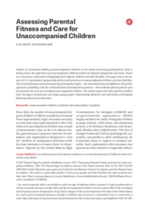Abstract
Despite an increasing visibility of unaccompanied children in the media and among policymakers, little is known about the experiences of unaccompanied children within and beyond immigration detention. Based on a three-year, multi-sited ethnography with migrant children and their families, this paper traces the impact of U.S. institutional sponsorship policies and practices on unaccompanied children and their families. The article delineates several intersecting institutional logics—the universalization of childhood, the pathologization of mobility, and the criminalization of transnational parents—that underpin federal policies and practices for the care and custody of unaccompanied children. The article argues that these policies overflow from the spaces of detention and shape young people’s help-seeking behaviors and sentiments of belonging following release from detention.
The walls here are bright yellow and there are posters all over saying we have human rights; but we have no rights here. They bring people here and show them, look how wonderful this place is and how they are taking care of us, but it isn’t that way. We are stuck here and we can’t get out. It’s like I am caught in this big joke but there is no punchline. —Isaias, age sixteen, Mexico

